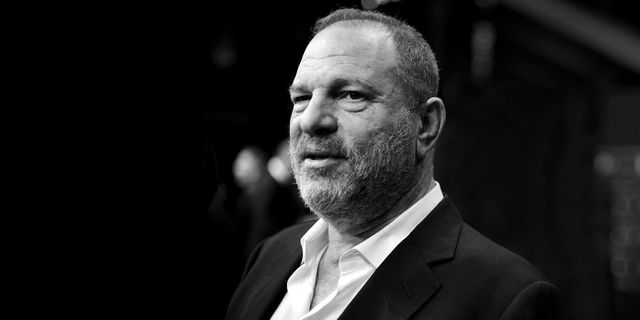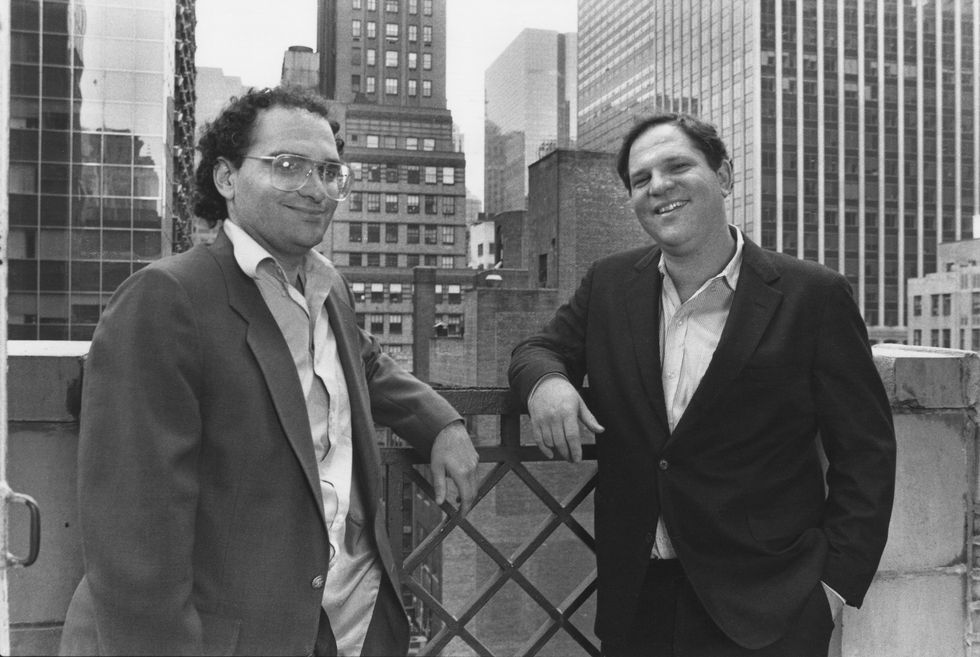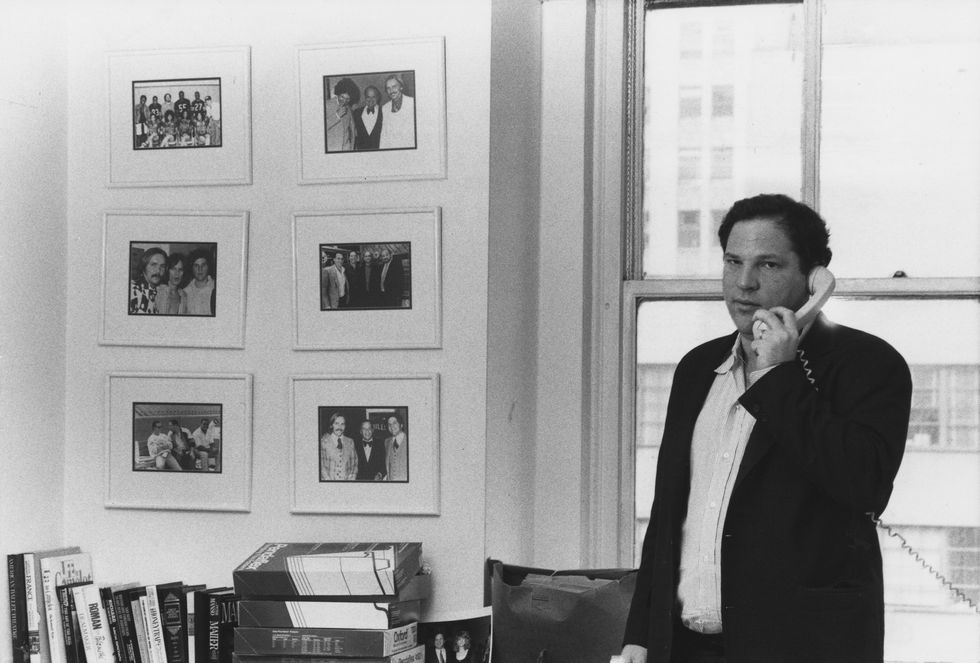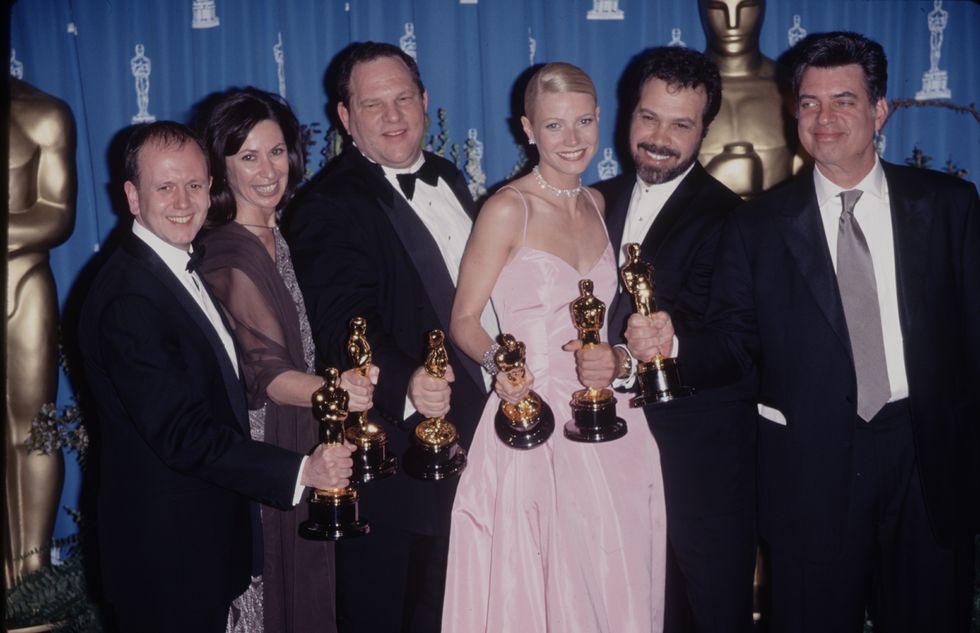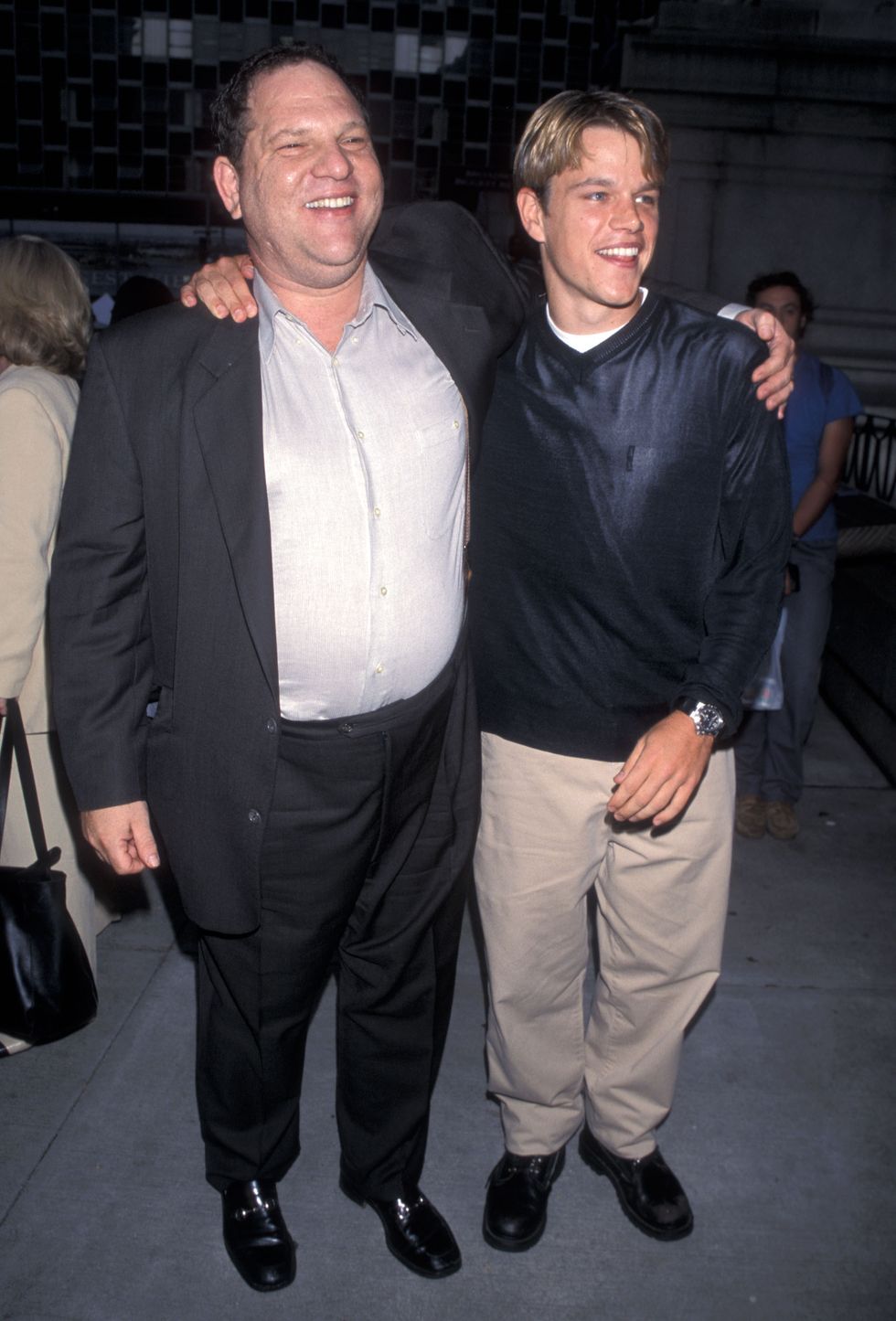The Weinstein Company fired co-founder Harvey Weinstein on Sunday night, three days after The New York Times published a bombshell exposé chronicling years of sexual-harassment allegations against the 65-year-old, at least eight of which ended in settlements. Following the publication of the Times report, at least one more woman has come forward with a story about her "disgusting encounter" with Weinstein. Many are awaiting more members of the Hollywood elite to speak out (Meryl Streep issued a statement on Monday).
Here's a look at his rise—and fall—from the top of the film industry.
Music Before Movies
Weinstein's foray into the entertainment business began while he was attending the Buffalo branch of the State University of New York, where he founded a concert promotion company with his friend, Corky Burger, called Harvey & Corky Presents. By 1973, Weinstein had dropped out of school and was running a beat-down 2,000-seat theatre in Buffalo, where he showed three movies for the price of one on Saturday nights, according to a 2002 New Yorker profile. His initial goal was to put on concerts, but not long after opening the theatre, Weinstein decided he wanted to produce movies.
He began commuting to New York City from Buffalo, where he worked part-time for Julian Schlossberg, the vice-president of East Coast production for Paramount, according to The New Yorker. In 1979, Harvey sold his share in Harvey & Corky Presents and founded Miramax, named after his parents Miriam and Max, with his younger brother, Bob. Miriam, a skilled secretary, was the receptionist at their office in midtown Manhattan.
Three years later, in 1982, Miramax released The Secret Policeman's Other Ball, a comedy benefitting Amnesty International that featured performances by Sting, Phil Collins, and the Monty Python troupe. It grossed $6 million, which wasn't exactly impressive by Hollywood standards, but put Miramax on the map. Over the next few years, the company struggled to produce a breakthrough hit. In 1986, it released Playing For Keeps, a teen comedy fraught with production problems that flopped in the box office. Miramax was down to 20 employees at the time, according to The New Yorker.
Miramax's Turning Point
But Miramax's fortunes improved with the release of three movies in a row in the late 1980s. In1988, the studio delivered Steven Soderbergh's Sex, Lies and Videotape, a Sundance hit which went on to gross $25 million, and Cinema Paradiso, an Italian film that won the Academy Award for Best Foreign Language Film. A year later, it put out My Left Foot, which earned the company its first Academy Award nomination for Best Picture. During the next 16 years, the studio produced and distributed hundreds of films, picking up 16 Best Picture nominations along the way.
The Weinstein brothers were recognised in the industry for their dedication to the art of movie-making. But, as described in documents obtained by the Times, working under the elder Weinstein brother was in many cases "toxic" for women. The paper reported, for instance, that a female assistant claims he badgered her into giving him a massage while he was naked, leaving her "crying and very distraught," her colleague, Lauren O'Connor, wrote in a 2015 memo obtained by the Times asserting sexual harassment and other misconduct by their boss. "There is a toxic environment for women at this company."
After reaching a settlement with Weinstein, O'Connor withdrew her complaint.
Weinstein's personality is notoriously intense, as often described by actors and media professionals. In a February 2004 Vanity Fair profile, Matt Damon likened Weinstein's behaviour to "the old tale of the scorpion and the frog."
The '90s Run
In 1993, one year after the studio earned its second Best Picture nomination for Neil Jordan's The Crying Game, Disney bought Miramax for a reported $60 million, in a deal that allowed Harvey and Bob Weinstein to continue running the studio. In 1994, they released Quentin Tarantino's Pulp Fiction, which grossed $213 million worldwide and picked up a Best Picture nomination. Weinstein's critically acclaimed films kept coming, one after another: The English Patient won the Oscar for Best Picture in 1997; Shakespeare in Love won Best Picture in 1999.
Weinstein, often photographed with the stars of his movies on red carpets and at parties, had quickly become one of the most powerful producers in Hollywood. He was both "a genius and an asshole," director James Ivory once told New York Magazine. "Unfortunately, those things go together."
In the '00s, Weinstein's personality became an ongoing punchline on HBO's Entourage, which introduced a foul-mouthed studio executive named Harvey Weingard in Season Two. Kevin Connolly, one of the stars of the show, said Weinstein berated him at a party over the character. "I'm at a party," he told The Hollywood Reporter. "Harvey Weinstein just came over and told me to tell my producers they're dead. 'Tell them if they ever mention my name again, they're dead.'" THR pointed out that those very lines ended up in a future episode.
The Namesake Company
In 2004, Weinstein was named an honorary Commander of the Order of the British Empire, for his contribution to the British film industry. He picked up multiple Tony Awards for producing plays and musicals. He married his second wife, fashion designer Georgina Chapman. In 2005, after leaving Miramax, he founded The Weinstein Company, which earned back-to-back Best Picture awards with The King's Speech in 2010 and The Artist in 2011.
In the Times story published last Thursday, the publication dug up legal records, emails and internal documents from his time both at Miramax and The Weinstein Company recounting accusations of sexual harassment. In response, Weinstein issued a lengthy and bizarre statement, in which he misquoted Jay Z, mentioned the National Rifle Association, and made a promise to his late mother.
"I realised some time ago that I needed to be a better person and my interactions with the people I work with have changed," he said. "I appreciate the way I've behaved with colleagues in the past has caused a lot of pain, and I sincerely apologise for it."
Weinstein is threatening to sue the Times. His attorney, Charles Harder, said in a statement that the story "is saturated with false and defamatory statements about Harvey Weinstein." Lisa Bloom, another lawyer advising Weinstein, said in a statement that "he denies many of the accusations as patently false." She resigned over the weekend.
Rose is a Senior Editor at ELLE overseeing features and projects about women's issues. She is an accomplished and compassionate storyteller and editor who excels in obtaining exclusive interviews and unearthing compelling features.
